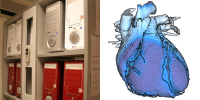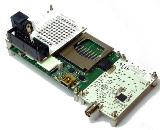COMMUNICATION SYSTEMS – E6
- Telecommunication systems and networks
- Communication protocols, services and applications
- Software tools for testing, modelling and simulation of communication systems
- Parallel and distributed systems
- Formal methods for the modelling, analysis and synthesis of discrete systems
- Computer modelling and simulations in medicine
- Measurements and processing of bio-signals
- Wireless sensor networks
- Modular platform VESNA for Wireless sensor networks deployment
Head of Department
Prof. Mihael Mohorčič, mihael.mohorcic@ijs.si
Telephone: +386 1 477 36 69
Secretary
Polona Anžur, B. Sc., polona.anzur@ijs.si
Telephone: +386 1 477 31 07
Tamara Matevc, tamara.matevc@ijs.si
Telephone: +386 1 477 38 70
Research and development activities at the department are carried out in the framework of the Communication Technology Laboratory (CTL), Parallel and Distributed Systems Laboratory (PDSL) and Networked Embedded Systems Laboratory (NESL). Te research work of the three laboratories is complementary, which reflects particularly in joint applied projects.
Research activities within the Communication Technology Laboratory are concerned mainly with the wireless access systems, which enable the end-user to access new services and applications and new multimedia contents, and next generation transport telecommunication’s networks. The emphasis in the investigation of transport network technologies and protocols is on route optimisation, mobility management and fixed-mobile convergence. Particular emphasis is given to the solutions providing network robustness, security and quality of services on all layers of the communication system. In radio communications the emphasis is on the research in the areas of radio propagation, multiple input multiple output (MIMO) antenna systems, access architectures for heterogeneous wireless networks, management of radio and network resources and cognitive communications. Due to the complexity of the real telecommunication systems and the dynamic nature of the operating environment, traffic load and users' behaviour, we are also developing suitable simulation and performance evaluation tools for communication procedures, protocols and applications, as well as for planning and dimensioning of telecommunication networks. In the frame of national and international projects we are developing advanced and innovative concepts and technologies enabling interworking, convergence of networks and mobility of terminals and networks.

In the Parallel and Distributed Systems Laboratory, we are focused on the development of efficient computer algorithms and on their reliable implementation on parallel and distributed computer systems. We are particularly interested in the methodology of quantitative and qualitative modelling and optimization with the help of networked information systems, in formal methods for the modelling, analysis and synthesis of discrete systems and in new procedures for efficient work in parallel and distributed computing environments. Special emphasis is given to the application of advanced computer simulation techniques that support complex medical procedures and for the simulation of biological systems. Spatial models of a human heart and knee, along with parallel programs for the simulation of their cooling during and after surgery, have been developed, incorporating heat transfer and fluid flow phenomena. We contribute also to the interdisciplinary research work with the University Medical Centre Ljubljana developing hardware and software equipment for measurement, processing and analysis of bio-signals, which support and improve non-invasive medical diagnostics such as multichannel ECG and NevroECG.

In the Networked Embedded Systems Laboratory we are mainly focused on the research and development in the area of Internet of Things and cognitive communications. The emphasis is on the vertical integration of different wireless sensor and communication network technologies with semantic technologies in the support of autonomous search and composition of sensors and sensor data, as well as on the development of new applications using various machine learning and decision making algorithms. Design and development of a modular and fully flexible platform VESNA for wireless sensor networks represents one of the main results of the laboratory in 2011. Different combinations of developed modules and supported technologies makes the platform well suited for the implementation of experimental sensor networks required in basic or applied research, as well as for the deployment of tailor made applications. Networked Embedded Systems Laboratory and its research activities also form part of the interdepartmental laboratory SensorLab, established together with the Laboratory of Artificial Intelligence (E3).
The Department of Communication Systems contributes with its research activities to several national and international projects. We coordinate and/or participate to several national research and development projects, as well as to applied projects for industrial partners. International activities include participation in bilateral projects, in European cooperation in the field of scientific and technical research (COST Actions), in EU's Framework Programmes for research and technological development (FP) and in European Space Agency (ESA) PECS project.
